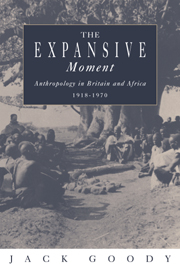Book contents
- Frontmatter
- Contents
- Introduction
- 1 The economic and organisational basis of British social anthropology in its formative period, 1930–1939: social reform in the colonies
- 2 Training for the field: the sorcerer's apprentices
- 3 Making it to the field as a Jew and a Red
- 4 Personal and intellectual friendships: Fortes and Evans-Pritchard
- 5 Personal and intellectual animosities: Evans-Pritchard, Malinowski and others
- 6 The Oxford Group
- 7 Some achievements of anthropology in Africa
- 8 Personal contributions
- 9 Concluding remarks
- Appendix 1 Changing research schemes
- Appendix 2 Towards the study of the history of social anthropology
- Notes
- List of references
- Index
2 - Training for the field: the sorcerer's apprentices
Published online by Cambridge University Press: 30 September 2009
- Frontmatter
- Contents
- Introduction
- 1 The economic and organisational basis of British social anthropology in its formative period, 1930–1939: social reform in the colonies
- 2 Training for the field: the sorcerer's apprentices
- 3 Making it to the field as a Jew and a Red
- 4 Personal and intellectual friendships: Fortes and Evans-Pritchard
- 5 Personal and intellectual animosities: Evans-Pritchard, Malinowski and others
- 6 The Oxford Group
- 7 Some achievements of anthropology in Africa
- 8 Personal contributions
- 9 Concluding remarks
- Appendix 1 Changing research schemes
- Appendix 2 Towards the study of the history of social anthropology
- Notes
- List of references
- Index
Summary
Once the Rockefeller Foundation had agreed to sponsor the Fellowship scheme, which started in July 1931, the Institute had to look round for possible recipients. It was here that Malinowski exercised his patronage and made his influence felt. While he had at first no official position with the Institute, his relations with the Foundation, his friendship with Oldham, the missionary administrator of the scheme, and his participation in meetings of the Africa group, which brought him into contact with the influential colonial administrator, Lord Lugard, and others, made his co-operation essential for the fulfilment of the programme, including the training of the participants.
In recruiting Fellows Malinowski naturally thought first of his own students, while the Directors of the Institute also played a part. But it was the Bureau, formed to administer the grants, that carried out the interviews and made recommendations to the Council of the Institute. The initial selection included a number of people with whom Malinowski had worked and approved of. ‘What then with Gordon Brown, Fortes, Audrey Richards, Margery Perham and Kirchkoff [sic], we have got quite a good set of young people.’ Additional Rockefeller Fellowships had been previously awarded to Lucy Mair, who was Lecturer in Colonial Administration (and whose mother was secretary of the School, under the Director, Beveridge) and Edith Clarke, a well-connected student of Jamaican background, who was about to go to the Gold Coast. All except Kirchhoff, who had already been employed by Rockefeller and was recommended by Westermann, Director of the Institute, were ‘students’ of Malinowski, though Gordon Brown was at Toronto, Audrey Richards teaching and Fortes had not yet studied anthropology.
- Type
- Chapter
- Information
- The Expansive MomentThe rise of Social Anthropology in Britain and Africa 1918–1970, pp. 26 - 41Publisher: Cambridge University PressPrint publication year: 1995



